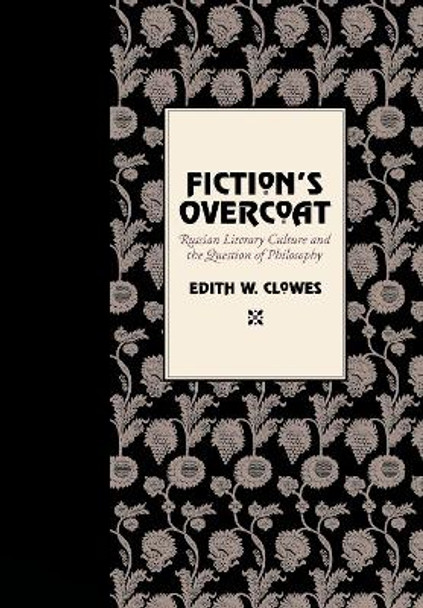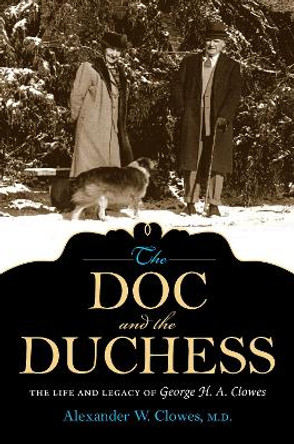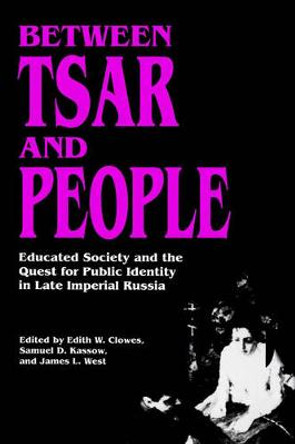Description
If Dostoevsky claimed that all Russian writers of his day "came out from Gogol's 'Overcoat,'" then Edith W. Clowes boldly expands his dramatic image to describe the emergence of Russian philosophy out from under the "overcoat" of Russian literature. In Fiction's Overcoat, Clowes responds to the view, commonly held by Western European and North American thinkers, that Russian culture has no philosophical tradition. If that is true, she asks, why do readers everywhere turn to the classics of Russian literature, at least in part because Russian writers so famously engage universal questions, because they are so "philosophical"? Her answer to this question is a lively and comprehensive volume that details the origins, submergence, and re-emergence of a rich and vital Russian philosophical tradition.During the late nineteenth and early twentieth centuries, Russian philosophy emerged in conversation with narrative fiction, radical journalism, and speculative theology, developing a distinct cultural discourse with its own claim to authority and truth. Leading Russian thinkers-Berdiaev, Losev, Rozanov, Shestov, and Solovyov-made philosophy the primary forum in which Russians debated metaphysical, aesthetic, and ethical questions as well as issues of individual and national identity. That debate was tragically truncated by the events of 1917 and the rise of the Soviet empire. Today, after seventy years of enforced silence, this particularly Russian philosophical culture has resurfaced. Fiction's Overcoat serves as a welcome guide to its complexities and nuances.Historians and cultural critics will find in Clowes's book the story of the increasing refinement and diversification of Russian cultural discourse, philosophers will find an alternative to the Western philosophical tradition, and students of literature will enjoy the opportunity to rethink the great Russian novelists-particularly Dostoevsky, Pasternak, and Platonov-as important voices in the process of shaping and sustaining a new philosophy and ensuring its survival into our own age.
About the Author
Edith W. Clowes is the Brown-Forman Professor of Arts and Sciences in the Department of Slavic Languages & Literatures at the University of Virginia. Her books include Russia on the Edge: Imagined Geographies and Post-Soviet Identity, also from Cornell, Doctor Zhivago: A Critical Companion, The Revolution of Moral Consciousness: Nietzsche and Russian Literature, and Russian Experimental Fiction: Resisting Ideology after Utopia.
Reviews
Edith Clowe's fine book is an impassioned argument for the distinctiveness and legitimacy of Russian philosophy in relation to its western counterpart.... The immense virtue of Clowe's book is to emphasize the formal richness and radically of Russian philosophy as an innovatively impure discourse unto itself, thereby preparing the necessary basis to pose this very contemporary question of authority anew and, thus, to assess whether Russian philosophy truly deals with the problems the German tradition sought to resolve. This further project of questioning, an extremely important and relevant one, belongs to studies that can build on what Clowe's book has first made visible-here new territory has been ventured upon in the most productive way.
-- Jeff Love, Clemson University * Slavic and East European Journal *In Fiction's Overcoat Edith Clowes offers a stimulating survey of the development of philosophical thought in Russia from the early nineteenth century to the first decade of the Soviet regime.... Edith Clowes has done a fine job in guiding the reader through the complex maze of Russian speculative thought.... Edith Clowe's book makes an original and valuable contribution to the study of the Russian philosophical tradition. It should engage the attention of those interested in Russian intellectual history, Russian literature, and, of course, the rich tradition of Russian speculative philosophy.
-- Julian W. Connolly, University of Virginia, Charlottesville * Partial Answers *The book title refers to Dostoevsky's observation that Russian writers of his generation emerged out of Gogol's famous short story The Overcoat. The author expands on this idea and argues that while Russia did not have a strong academic philosophical tradition during the nineteenth century, a vibrant philosophical culture did emerge then from the 'overcoat' of a well-established Russian literary tradition, rather than from the Western philosophical tradition. Russian philosophy developed in the context of an ongoing conversation with literature, radical social writing, and theology. The result was a... tradition that passionately debated a wide range of issues, including metaphysical, aesthetic, and ethical questions.
* Choice *Those interested in the historical dynamics of the dialogue between literature and philosophy in modern Russia have often tended to view literature as a successful substitute for an absent tradition of (western) philosophizing. In her book, Fiction's Overcoat, Edith Clowes has chosen a different, methodologically more sophisticated approach. She steers away from the notion of literature as a mere replacement or reflection of philosophy; instead, she endeavors to show that Russian philosophy grew from the tissue of literature and preserved these birth marks all along, thus assuming an identity of its own, different from mainstream western philosophy but no less valuable for that.... Clowes has written a thoughtful book that will be of great interest to scholars and graduate students in Russian literature and intellectual history. Her exposition, sensitive to detail and at the same time secure in outlining the wider picture, adds to our perception of the interaction between literature and philosophy in Russia over the last two centuries.
-- Galin Tihanov, Lancaster University * Slavic Review *Book Information
ISBN 9780801441929
Author Edith W. Clowes
Format Hardback
Page Count 320
Imprint Cornell University Press
Publisher Cornell University Press
Weight(grams) 907g
Dimensions(mm) 235mm * 155mm * 25mm





